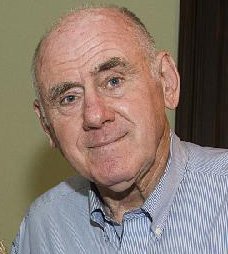Robert Johnston would do whatever was necessary to help people in need in Little Rock, whether that meant battling City Hall about its responsibility to aid the homeless or volunteering to serve breakfast beneath the Broadway Bridge to the hungry, some who remembered him said Thursday.
Johnston, who was a Rhodes scholar, decorated athlete, former state legislator and former chairman of the state Public Service Commission in addition to being a strong advocate for the homeless, died Wednesday afternoon. He was 77.
Johnston collapsed while jogging on Broadway in downtown Little Rock, witnesses told police. He was pronounced dead at the scene.
"He will be very, very missed," said Sandra Wilson, who founded the Arkansas Homeless Coalition. "It's going to be a huge void."
Wilson knew Johnston for about 25 years through his volunteer work and for his Feed the Hungry breakfast program, she said. The program fed breakfast five days a week for 12 years to the homeless of Little Rock.
"Robert was very active in the Homeless Coalition for many, many years," she said. "He always pushed us to go a little further than we were going. He was always looking at something and saying, 'What are we going to do about it?'"
Johnston had always donated and volunteered to help the needy, Wilson said, but he became more involved after the Washington-based National Coalition for the Homeless named Little Rock in November 2004 as the nation's "meanest" city toward the homeless.
In May 2004, the city began efforts to move out many homeless camps and discourage groups from serving meals under the Broadway Bridge, because of unsanitary conditions and because employees at nearby City Hall had complained about being hassled by the homeless, according to Arkansas Democrat-Gazette articles from the time.
"I was doing a protest when the city had gone in and torn out locations where homeless guys were staying," Wilson recalled. "Robert drove up in his truck and had some homeless guys with him who were being dislocated. He had picked them up and drove around and helped them to find someplace to stay. That's what he did. He just didn't talk, but he took action."
After the city failed to find a place to relocate Johnston's Feed the Hungry breakfast program from beneath the Broadway Bridge, Johnston showed up unannounced at City Hall on a December 2006 morning and served breakfast to about a dozen homeless people. Under a compromise reached later, the city agreed to allow Johnston to serve breakfast near the basement entrance of the building, according to newspaper articles.
"He could often be very abrasive, but you don't usually get things done if you're not willing to put your neck on the line," Wilson said.
Jim Dailey, Little Rock's mayor at the time, remembered having "some fairly direct conversations at times" with Johnston about the city's actions toward the homeless.
"But at the same time, he was making his point about the city needing to be providing help for the homeless," Dailey said Thursday. "I think he was effective in gaining our attention that the answer wasn't necessarily to run them off, but to find a way to assist and also be grateful to folks like Robert and others who were performing a good Christian service by providing food for the homeless.
"My regard for him was very high, although sometimes he would push the edge of the legal limits on some things," Dailey said.
When the former Riverfest music and arts festival displaced many homeless in 2007, Johnston organized an effort to serve breakfast in the City Hall parking garage that weekend. First lady Ginger Beebe joined the effort to help feed about 50 homeless, according to a newspaper article.
"Ginger thought the world of him," former Gov. Mike Beebe said Thursday by phone when he learned of Johnston's death. "I remember him as a serious and dedicated and compassionate human being."
Johnston had storied careers in academics and politics. He was an instructor in political science and economics at the U.S. Military Academy at West Point before joining the University of Arkansas at Little Rock as a political science professor for 13 years. Johnston then served in the state House of Representatives from 1973-81.
Gov. Bill Clinton appointed Johnston to a six-year term as chairman of the state Public Service Commission in 1983, one of the highest profile positions in state government.
"When I became governor, he was an accomplished state legislator, and I appointed him chairman of the Public Service Commission, a tough job he handled with brilliance and good judgment," Clinton said of Johnston Thursday. "We stayed in touch when I became president, and people all over the world sought his advice and help.
"I'll always be grateful for his friendship, his service, and all the miles we ran together, from Arkansas to Washington, D.C., to Kiev, Ukraine. He lived a good full life, devoting his immense talents to service."
During his chairmanship, Johnston presided over a turbulent era of utility regulation that included negotiation of Arkansas ratepayers costs in the Grand Gulf nuclear plant settlement with Arkansas Power & Light Co. in 1985, a time Johnston called "by far the most difficult of my tenure" in a 1990 interview with the Arkansas Democrat.
A Pine Bluff native, Johnston was named a Rhodes scholar in 1963 after graduating from Rice University in Houston, where he had been an All-Southwest Conference tackle and a National Football Foundation Scholar Athlete. The university honored him with the Bob Quin Award in 1962, presented annually to the most outstanding, all-around senior male athlete at Rice.
Drafted and signed by the Dallas Cowboys, Johnston instead accepted his Rhodes scholarship to Oxford University, where he earned bachelor's and master's degrees, while also lettering twice in basketball and rowing and playing on the college rugby team. He went on to earn a doctorate in government and economic stabilization from Columbia University.
Metro on 09/22/2017
